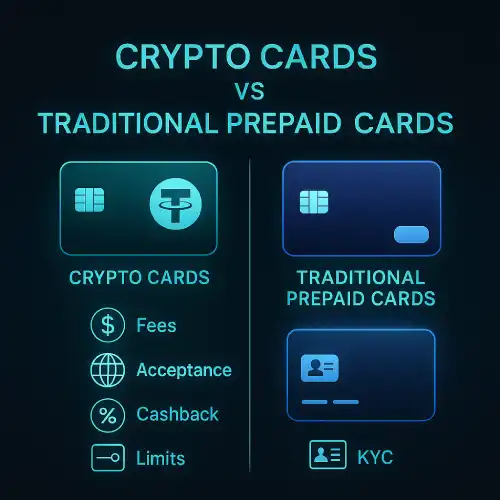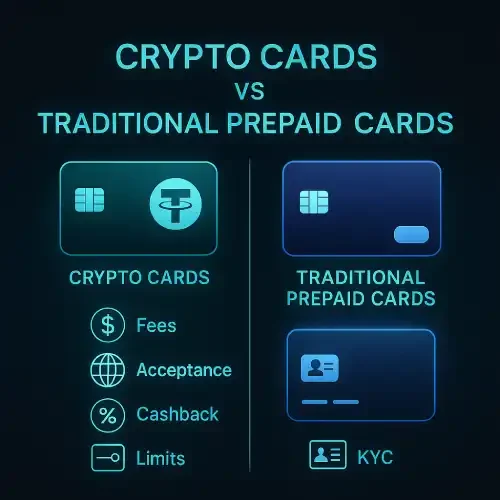Crypto Cards vs Traditional Prepaid Cards
Crypto Cards vs Traditional Debit Cards: What’s Better for You?
In the age of digital finance, both crypto cards and traditional debit cards offer users flexibility, budget control, and access to global payments. But while they may serve similar functions, they are built on entirely different financial infrastructures. In this side-by-side breakdown, we’ll compare these two card types to help you decide which one fits your spending habits and lifestyle.

Traditional Prepaid Cards
Prepaid cards have been around for decades, offering users a convenient way to load money and spend it without needing a full bank account.
Key Features:
- Card Type: Physical or virtual prepaid card
- Currency: Fiat currencies like USD, EUR, IR
- Network: Visa / Mastercard
- Reload Method: Bank transfer, cash deposit, payroll
- KYC: Basic KYC required
- Acceptance: Accepted globally where Visa/Mastercard is supported
- Stability: Tied to fiat value, no fluctuation
Ideal For:
- Users without access to traditional bank accounts
- Teens, travelers, and budget-conscious spenders
- Those who want fixed spending control
Crypto Cards
Crypto cards are the next generation of payment tools, allowing users to spend cryptocurrencies like USDT, BTC, or ETH in real-time, seamlessly converting them into fiat at point of sale.
Modern Features:
- Card Type: Virtual or physical crypto card
- Currency: USDT, BTC, ETH (converted to fiat on usage)
- Reload Method: On-chain top-up with stablecoins or crypto
- Network: Visa / Mastercard
- KYC & Wallet Connection: Required for security and compliance
- Extra Benefits: Cashback, rewards, referral bonuses, multi-chain support
Ideal For:
- Crypto holders and traders
- Freelancers earning in crypto
- Globally mobile individuals who want financial flexibility
- Users seeking enhanced privacy and borderless spending
Side-by-Side Comparison
| Feature | Traditional Debit Card | Crypto Card |
|---|---|---|
| Currency | Fiat (USD, IR, EUR) | Crypto (USDT, BTC, etc.) |
| Top-Up Method | Bank / Cash | Crypto wallet transfer |
| Card Network | Visa / Mastercard | Visa / Mastercard |
| Conversion Fees | Usually flat | Varies based on exchange rate |
| Acceptance | Global | Global |
| Market Volatility Risk | None | Low (if using stablecoins) |
| Extra Perks | Limited | Cashback, rewards, affiliate |
| Blockchain Integration | No | Yes |
| Onboarding | Simple | Slightly technical |
Conclusion
If you want simple, stable, and traditional banking-like functionality, a debit card is a safe and familiar option. But if you’re living a crypto-first lifestyle, freelancing globally, or just want the flexibility of borderless digital assets, then a crypto card like those offered by Tevau opens up a whole new realm of possibilities.
Whichever you choose, make sure it fits your spending habits, tech comfort, and financial goals — and remember, the future of payments is already evolving.










